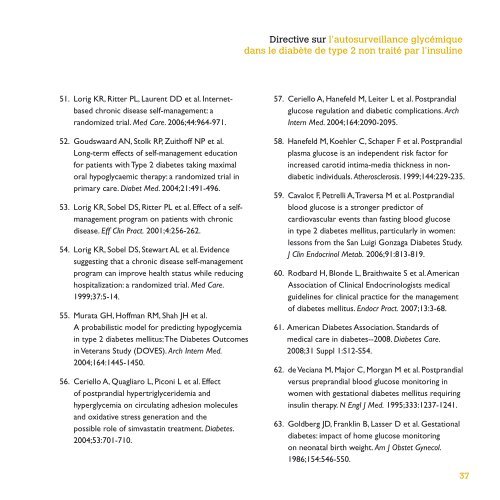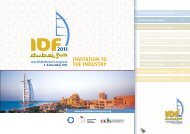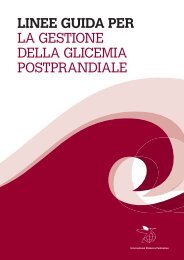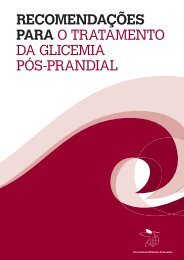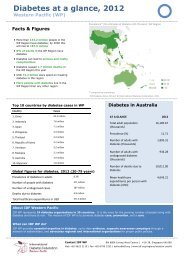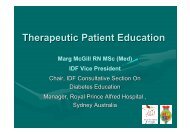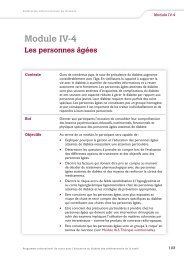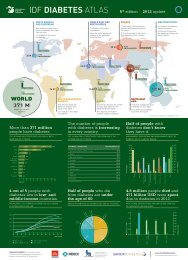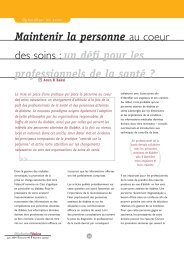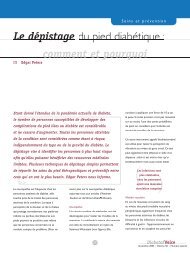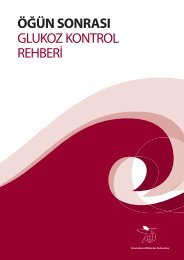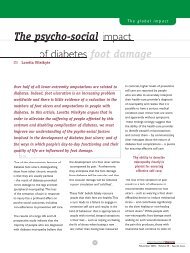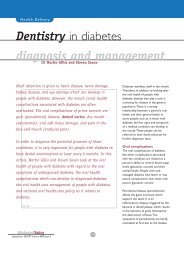Autosurveillance - International Diabetes Federation
Autosurveillance - International Diabetes Federation
Autosurveillance - International Diabetes Federation
You also want an ePaper? Increase the reach of your titles
YUMPU automatically turns print PDFs into web optimized ePapers that Google loves.
Directive sur l’autosurveillance glycémique<br />
dans le diabète de type 2 non traité par l’insuline<br />
51. Lorig KR, Ritter PL, Laurent DD et al. Internetbased<br />
chronic disease self-management: a<br />
randomized trial. Med Care. 2006;44:964-971.<br />
52. Goudswaard AN, Stolk RP, Zuithoff NP et al.<br />
Long-term effects of self-management education<br />
for patients with Type 2 diabetes taking maximal<br />
oral hypoglycaemic therapy: a randomized trial in<br />
primary care. Diabet Med. 2004;21:491-496.<br />
53. Lorig KR, Sobel DS, Ritter PL et al. Effect of a selfmanagement<br />
program on patients with chronic<br />
disease. Eff Clin Pract. 2001;4:256-262.<br />
54. Lorig KR, Sobel DS, Stewart AL et al. Evidence<br />
suggesting that a chronic disease self-management<br />
program can improve health status while reducing<br />
hospitalization: a randomized trial. Med Care.<br />
1999;37:5-14.<br />
55. Murata GH, Hoffman RM, Shah JH et al.<br />
A probabilistic model for predicting hypoglycemia<br />
in type 2 diabetes mellitus: The <strong>Diabetes</strong> Outcomes<br />
in Veterans Study (DOVES). Arch Intern Med.<br />
2004;164:1445-1450.<br />
56. Ceriello A, Quagliaro L, Piconi L et al. Effect<br />
of postprandial hypertriglyceridemia and<br />
hyperglycemia on circulating adhesion molecules<br />
and oxidative stress generation and the<br />
possible role of simvastatin treatment. <strong>Diabetes</strong>.<br />
2004;53:701-710.<br />
57. Ceriello A, Hanefeld M, Leiter L et al. Postprandial<br />
glucose regulation and diabetic complications. Arch<br />
Intern Med. 2004;164:2090-2095.<br />
58. Hanefeld M, Koehler C, Schaper F et al. Postprandial<br />
plasma glucose is an independent risk factor for<br />
increased carotid intima-media thickness in nondiabetic<br />
individuals. Atherosclerosis. 1999;144:229-235.<br />
59. Cavalot F, Petrelli A, Traversa M et al. Postprandial<br />
blood glucose is a stronger predictor of<br />
cardiovascular events than fasting blood glucose<br />
in type 2 diabetes mellitus, particularly in women:<br />
lessons from the San Luigi Gonzaga <strong>Diabetes</strong> Study.<br />
J Clin Endocrinol Metab. 2006;91:813-819.<br />
60. Rodbard H, Blonde L, Braithwaite S et al. American<br />
Association of Clinical Endocrinologists medical<br />
guidelines for clinical practice for the management<br />
of diabetes mellitus. Endocr Pract. 2007;13:3-68.<br />
61. American <strong>Diabetes</strong> Association. Standards of<br />
medical care in diabetes--2008. <strong>Diabetes</strong> Care.<br />
2008;31 Suppl 1:S12-S54.<br />
62. de Veciana M, Major C, Morgan M et al. Postprandial<br />
versus preprandial blood glucose monitoring in<br />
women with gestational diabetes mellitus requiring<br />
insulin therapy. N Engl J Med. 1995;333:1237-1241.<br />
63. Goldberg JD, Franklin B, Lasser D et al. Gestational<br />
diabetes: impact of home glucose monitoring<br />
on neonatal birth weight. Am J Obstet Gynecol.<br />
1986;154:546-550.<br />
37


